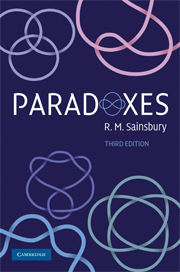Book contents
- Frontmatter
- Contents
- Foreword to third edition
- Introduction
- 1 Zeno's paradoxes: space, time, and motion
- 2 Moral paradoxes
- 3 Vagueness: the paradox of the heap
- 4 Acting rationally
- 5 Believing rationally
- 6 Classes and truth
- 7 Are any contradictions acceptable?
- Appendix I Some more paradoxes
- Appendix II Remarks on some text questions and appended paradoxes
- Bibliography
- Index
Introduction
Published online by Cambridge University Press: 05 June 2012
- Frontmatter
- Contents
- Foreword to third edition
- Introduction
- 1 Zeno's paradoxes: space, time, and motion
- 2 Moral paradoxes
- 3 Vagueness: the paradox of the heap
- 4 Acting rationally
- 5 Believing rationally
- 6 Classes and truth
- 7 Are any contradictions acceptable?
- Appendix I Some more paradoxes
- Appendix II Remarks on some text questions and appended paradoxes
- Bibliography
- Index
Summary
Paradoxes are fun. In most cases, they are easy to state and immediately provoke one into trying to “solve” them.
One of the hardest paradoxes to handle is also one of the easiest to state: the Liar paradox. One version of it asks you to consider the man who simply says, “What I am now saying is false.” Is what he says true or false? The problem is that if he speaks truly, he is truly saying that what he says is false, so he is speaking falsely; but if he is speaking falsely, then, since this is just what he says he is doing, he must be speaking truly. So if what he says is false, it is true; and if it is true, it is false. This paradox is said to have “tormented many ancient logicians and caused the premature death of at least one of them, Philetas of Cos.” Fun can go too far.
Paradoxes are serious. Unlike party puzzles and teasers, which are also fun, paradoxes raise serious problems. Historically, they are associated with crises in thought and with revolutionary advances. To grapple with them is not merely to engage in an intellectual game, but is to come to grips with key issues. In this book, I report some famous (and some less famous) paradoxes and indicate how one might respond to them. These responses lead into some rather deep waters.
- Type
- Chapter
- Information
- Paradoxes , pp. 1 - 3Publisher: Cambridge University PressPrint publication year: 2009



